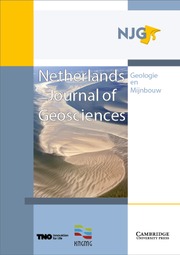Article contents
Geo(Im)pulse | River Meuse suspended sediment yield: a new estimate and past estimates revisited
Published online by Cambridge University Press: 01 April 2016
Abstract
Despite increasing research into changes in the discharge of the River Meuse, estimates of the river’s sediment yield are less forthcoming. Three published studies (in 1883, 1982, and 1987) have estimated suspended sediment yield at the Belgian-Dutch border; the latter two studies surmise that this increased substantially between the late 19th and 20th Centuries. In this paper a more recent and longer time-series of observed discharge and suspended sediment data (1995 – 2005) is used to estimate mean annual suspended sediment yield (ca. 386,000 Mg.a−1), and the results of the previous studies are revisited. New insights suggest that those studies do not in themselves provide evidence of increased sediment yield: the higher estimates in the late 20th Century could equally be due to interannual variability or methodological differences. Furthermore, there has been no significant increase in rainfall erosivity between the late 19th and 20th Centuries, and the effect of land use change over that time would have been to cause a decrease in suspended sediment yield, rather than an increase.
- Type
- Research Article
- Information
- Copyright
- Copyright © Stichting Netherlands Journal of Geosciences 2008
References
- 8
- Cited by


